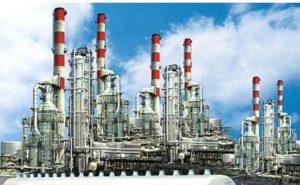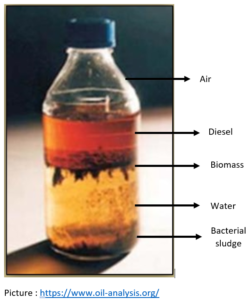![]()
 Bio-diesel fuel oil is a natural product that is inherently unstable and has a shelf-life.
Bio-diesel fuel oil is a natural product that is inherently unstable and has a shelf-life.
Due to the worldwide environmental legislations about carbon neutrality, emissions and the “Global Sulphur Cap”, the bio component of fuels is steadily increasing. (ex. EN 16942:2016 , CEN/TC 441).
Consequently, the presence of SG’s (Sterol Glucosides ) and FAME’s (Fatty Acid Methyl Ester) increases.
Temperature differences in fueltanks will attract humidity from the atmosphere by breathing and form small amounts of condensate. This results in free-water with microbiological growth at the bottom of the tank.
Microbial spores and fungi present in the water will start using the fuel as food and begin  multiplying.
multiplying.![]()
When exposed to optimal (tropical) temperatures and especially with (long time) stagnant volumes of fuel, this growth process will even accelerate.
This can occur in any type of diesel fuel but especially in biodiesel made from plant and animal fats.
It is recognized that most of the problems can be expected in back-up generators such as used in hospitals, airports, govmt. buildings and stand-by electricity generating stations
When the microbial colonization grows beyond control it will cause corrosion (acid forming) and will produce slime, algae, sludge build-up, floating debris, foul odor, etc…
Filters and injectors may become blocked which results in equipment breakdown and extra cleaning costs.
A low-power transducer installed on the wall of a fueltank will avoid biofilm formation and stop colonization of these micro-organisms and algae.
You can test the existence of microbial life in fuel trough ASTM-D7463-08 , and you can treat your fuel with biocides and by draining but this is both time consuming and expensive… thus better to be avoided.
If there is a little water present in boat-or jetfuel, there is a specific danger of growing filamentous fungus like Hormoconis resinae (or known as H Res or Cladosporium resinae). They grow near the water-oil-interface or in the biofilm at tank walls and feed from the hydrocarbons. They also cause slime formation and blockage of injectors and filters.
Read more : BP-fuel news
